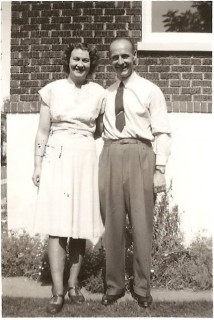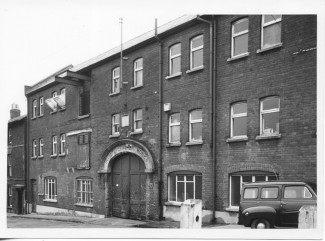A History of Invicta Leather Works
Rita L. Jacob


It is thought that Invicta was founded by Mr Woodlands in 1824; the works then being next to the Woolpack in Endless Street and employing only three to four men. The Ware family acquired the business in 1862 and, by the turn of the century, there was a workforce of over one hundred producing ‘all classes of English and foreign leather’ for machine bands, leggings, saddles and tack as well as boots and shoes.
In 1901, however, the Invicta premises in Endless Street were destroyed by fire and subsequently abandoned in favour of a specially built factory on a strip of land between Culver Street and Rampart Road with an arched entrance in Paynes Hill. Opening in 1902, it produced leather for thousands of army boots during the First World War yet, according to one source, was closed in 1923; later being taken over by a group of Germans from Cologne.
Another source, however, gives a different version of events, Invicta changing hands between 1935 and 1936 upon the retirement of Mr H. G. Ware and becoming Colonia Ltd. After this date, some workers were brought over from Germany and the factory began to specialise in the tanning of exotic skins, including those from snakes, crocodiles, eels and elephants.
In 1939, the owners fled back to Germany, the Government using the Enemy Aliens Act to seize and close the factory. Those German workers, who had not followed their employers, were interned, one named Ernst Kolk being sent to Canada for the duration. Having made friends through a cycling club, Ernst returned to Salisbury after the war and married a local girl; both emigrating to the United States in the summer of 1947.
Invicta/Colonia was sold in 1945 and, by 1956, employed about eighty people; the works again processing imported skins for the shoe and fancy good trades. For some reason, however, the chimney began to emit brown smuts, these burning holes in washing hung on garden lines. Being a source of employment, residents tolerated the unpleasant smells when the wind was blowing in a certain direction, the noise of night working during busy periods and even skins floating under the floorboards but these smuts really angered them. Letters were written, visits made to the Council and interviews arranged on Southern Television before the management finally addressed the problem; one measure being to raise the height of the offending chimney.
In 1969, the Council acquired all land and buildings in the area for the development of a dual carriageway; a Compulsory Purchase Order being used to force the owners to sell. The premises were demolished a year later and the rubble used as hardcore for the new road; the ghost of Invicta lingering beneath the wheels of vehicles travelling along Churchill Way!
In the 1950s, Invicta employed eighty workers. Were you one of them?




Comments about this page
Joyce Evans in the picture was my grandmother.
Does anyone know anything of my Great Grandfather – William Edward Hall, (Died 1969) that worked for Ware’s for 40(?) years?
His father Edward, before him also worked as a Currier.
William was a Labour Councillor in his retirement – around 1945.
He also had a long connection with the Salisbury CoOp as President for 40+ years, and was a lay preacher. A very busy man!
I think I worked there in the summer of 1963 as a fresh faced quite innocent sixteen year old boy. I spent many happy hours upstairs. Downstairs I remember a great group of happy and naughty girls in the wet treatment processes areas. I wish I had worked with them but I was put with the upstairs staff where we pegged out then scraped the skins so they became soft and ready for the next stages. It was a great holiday job learning the gritty reality of work in a tannery in the middle of Salisbury! Thank you for recording this bit of local history.
I worked there as a young lad pushed wooden trollies full of skin’s from process to dying and wash barrels , large round drum barrels that I would climb inside to retrieve dyed wet skins which would go to shaving machine to be thinned down the up to the pegging room where they would be stretched buy two old boys , then hung on great wooden board buy pegs made of steel and cork there was my next job depeging, skins both side hung buy great rollers me and a mate called Ian Packwood loved tea break l would make Shure I go through the polishing room just to look at the girls who were older than me and I fell in love with all of them ooopis waffling sorry
Fascinating! I had no idea about Invicta until i came across a booklet produced in 1897 for Victoria’s jubilee, that had a whole article on it (i posted photos and extracts on Facebook in the Fisherton History group) which led to more comments leading me to this website post! Amazing story, a microcosm of industries everywhere in the last 2 centuries!
Add a comment about this page